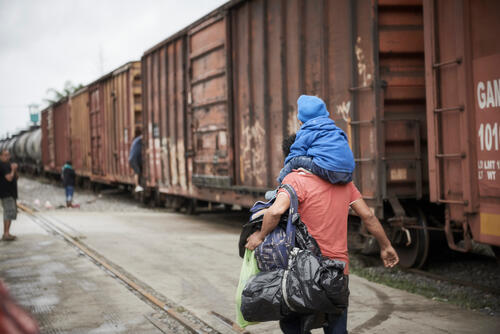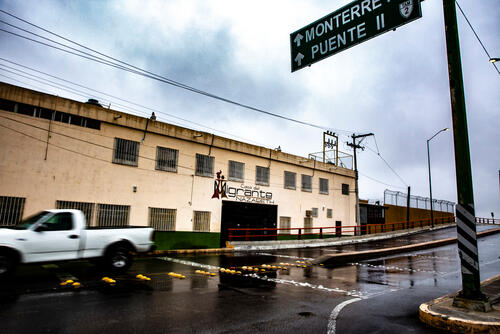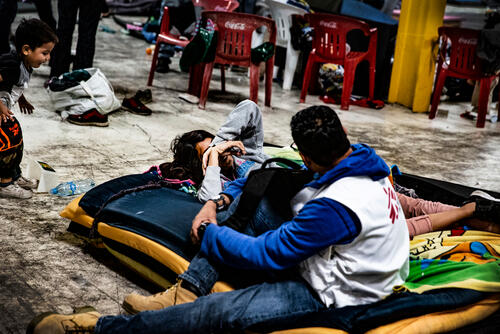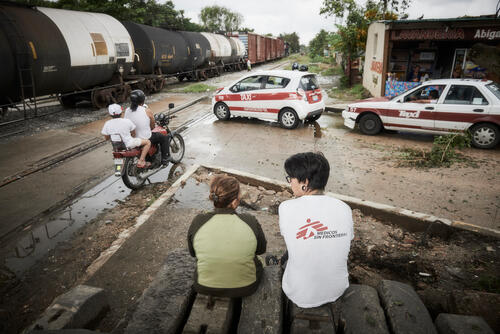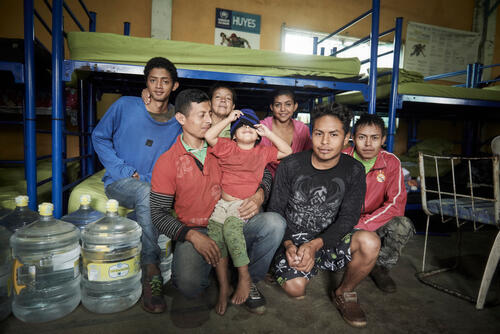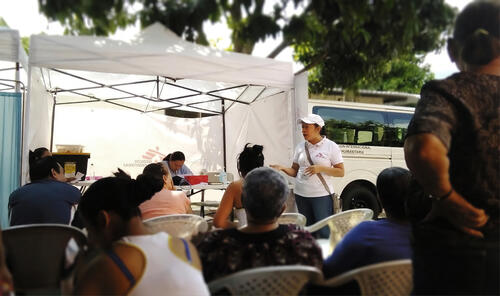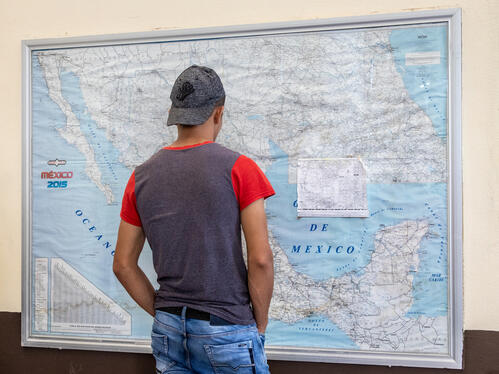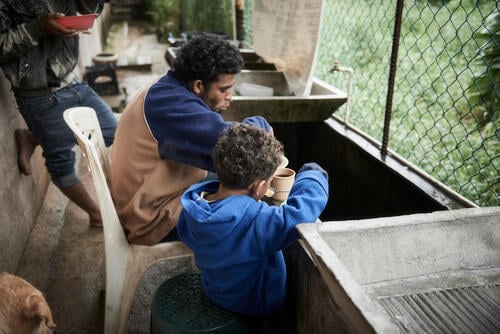Thousands of migrants and asylum seekers are currently living in shelters and on the streets of violent Mexican border cities, such as Reynosa, Mexicali and Nuevo Laredo. They live in uncertainty because the US government has forced them to stay in Mexico, including some who have legally filed their asylum applications in the United States. They fear for their safety and are not sure of their future.
In these cities, there are only a small number of shelters where migrants and asylum seekers can find refuge, and many of them are already at maximum capacity. This has forced those migrants and asylum seekers that cannot find beds to live instead on the street, with little money and no access to either medical or legal assistance.
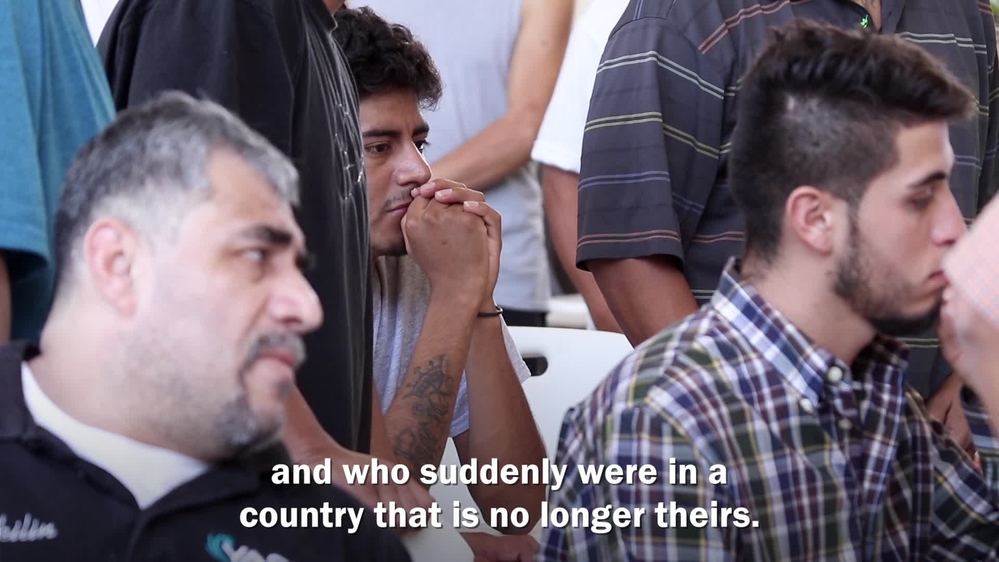
Providing assistance to people on the Mexican migration route
At this point along the border, in Nuevo Laredo, kidnapping is the order of the dayFelipe Reyes, Psychologist with Médecins Sans Frontières
Violence rife across the region
Even as the US administration fans the flames of a ‘state of emergency’ at the border with Mexico, the real crisis is the terrible violence and inhumane treatment that many migrants and asylum seekers have experienced in their home countries. It is this violence, which is rife across Guatemala, Honduras and El Salvador, that causes thousands of families to make the hard decision to leave and begin their journey north.
Yet, this abuse is repeated; first as they travel through Mexico, and then again once they are stranded at the border. People travel to the border seeking protection against abuse and violence, but run into it on more than one occasion on their journey through Mexico.
“At this point along the border, in Nuevo Laredo, kidnapping is the order of the day,” says Felipe Reyes. “For that reason, migrants don’t walk in the streets because it is very dangerous.”
Fleeing people dealing with a tumult of emotions
Felipe is a psychologist with Médecins Sans Frontières (MSF) who helps migrants, asylum seekers and deported Mexicans in two shelters in the city, La Casa Amar and Casa del Migrante Nazaret. At the shelters MSF provides medical, psychological and social assistance to hundreds of people who arrive at the border.
“It is a very difficult situation for the people I talk with. They have to deal with sadness, depression, feelings of guilt and suicidal thoughts,” says Reyes. “They have sleep disorders and suffer from anxiety because the waiting lists to start asylum procedures are very long and there is no certainty of refuge for them.”
Alongside his MSF medical colleagues, Reyes witnesses this kind of emotional trauma every day.
Robbed, assaulted, kidnapped – with nowhere to turn
José is a Honduran man who was robbed and assaulted during his long journey through Mexico. He travelled with his brothers and sister to the Mexican border where they planned to start their asylum applications because gangs in Honduras had threatened to kill them. But they did not find any sanctuary in Mexico. He recalls the painful moment when his sister was kidnapped, as they arrived in Nuevo Laredo.
“When we got off the bus, some men dragged my brother and me away and took my sister somewhere else. After a few hours my brother and I were released, but she wasn’t,” José says. “We still do not have any news of her. We paid five thousand dollars in ransom, which was all we had, but they have not released her.”
“I do not know who can help us. We do not trust the police here,” José continues. “Our plan was to start the refugee application process in the USA, but now I do not want to leave here until I know what has happened to her”.
I do not know who can help us. We do not trust the police here.José, Honduran man in Nuevo Laredo
Trying to build new lives – but Mexico is not an option
For the men and women who fled the violence of their home countries with their families, we see how difficult it is for them to try to find their new identities, with their desire to build new lives for their children amidst the terror of living in Mexico, and the fear of having to return to their former homes.
“For two years we suffered extortion, until the day came when we could no longer pay. I mortgaged my home and we sold everything,” recalls Margarita, a 36-year-old migrant from Guatemala who arrived at the Mexican border with her husband and three daughters, aged 16, seven and six.
“My dream was never the American dream. I had a good life with my family, but they [the gangs] left us with no choice. We want to follow the rules. Here they gave us a humanitarian visa, but Mexico is not an option for my family,” says Margarita. She was almost kidnapped at the Nuevo Laredo bus station. “They wanted to take my daughters, I screamed with all my strength and we managed to escape. We are going to wait here as we have been asked, before requesting asylum in the United States.” She says this with resignation because she knows that at the moment she has no other option.
Despite her age, Margarita's youngest daughter is aware of the difficult situation her family has had to live through. When her mother asks, “Do you want us to go back to Guatemala?”, she replies without hesitation, “no, because they kill you there.”



